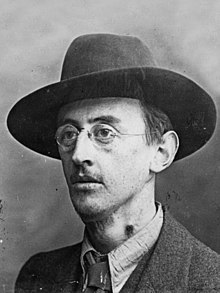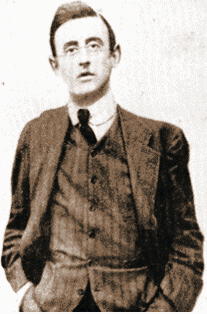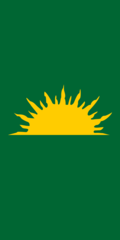A | B | C | D | E | F | G | H | CH | I | J | K | L | M | N | O | P | Q | R | S | T | U | V | W | X | Y | Z | 0 | 1 | 2 | 3 | 4 | 5 | 6 | 7 | 8 | 9
Joseph Plunkett Seosamh Pluincéid | |
|---|---|
 | |
| Born | 21 November 1887 Dublin, Ireland |
| Died | 4 May 1916 (aged 28) Kilmainham Gaol, Dublin, Ireland |
| Cause of death | Execution by firing squad |
| Buried | Arbour Hill Prison, Dublin |
| Allegiance | Irish Volunteers Irish Republican Brotherhood |
| Years of service | 1913–1916 |
| Rank | Commandant General |
| Unit | Dublin Brigade, Irish Volunteers |
| Commands held | General Post Office, Dublin |
| Battles/wars | Easter Rising |
| Spouse(s) | Grace Gifford (m. 4 May 1916) |
Joseph Mary Plunkett (Irish: Seosamh Máire Pluincéid; 21 November 1887 – 4 May 1916) was an Irish republican, poet and journalist. As a leader of the 1916 Easter Rising, he was one of the seven signatories to the Proclamation of the Irish Republic. Plunkett married Grace Gifford in 1916, seven hours before his execution.
Background
Plunkett was born at 26 Upper Fitzwilliam Street in one of Dublin's most affluent districts.[1] Both his parents came from wealthy backgrounds,[2] and his father, George Noble Plunkett, had been made a papal count.[3]
Plunkett contracted tuberculosis (TB) at a young age and spent part of his youth in the warmer climates of the Mediterranean and North Africa. He spent time in Algiers where he studied Arabic literature and language and composed poetry in Arabic.[4] He was educated at the Catholic University School (CUS) and by the Jesuits at Belvedere College in Dublin and later at Stonyhurst College, in Lancashire, England where he acquired some military knowledge from the Officers' Training Corps. Throughout his life, Joseph Plunkett took an active interest in Irish heritage and the Irish language, and also studied Esperanto. Plunkett was one of the founders of the Irish Esperanto Association in 1907.[5] He joined the Gaelic League and began studying with Thomas MacDonagh, with whom he formed a lifelong friendship. The two were both poets with an interest in theatre, and both were early members of the Irish Volunteers, joining their provisional committee. Plunkett's interest in Irish nationalism spread throughout his family, notably to his younger brothers George and John, as well as his father, who allowed his property in Kimmage, south Dublin, to be used as a training camp for young men who wished to escape conscription in Britain during the First World War.
IRB involvement

Sometime in 1915, Joseph Plunkett joined the Irish Republican Brotherhood and soon after was sent to Germany to meet with Roger Casement, who was negotiating with the German government on behalf of Ireland. Casement's role as emissary was self-appointed, and, as he was not a member of the IRB, that organisation's leadership wished to have one of their own contact Germany to negotiate German aid for an uprising the following year. He was seeking (but not limiting himself to) a shipment of arms. Casement, on the other hand, spent most of his energies recruiting Irish prisoners of war in Germany to form a brigade to fight instead for Ireland. Some nationalists in Ireland saw this as a fruitless endeavour and preferred to seek weapons. Plunkett successfully got a promise of a German arms shipment to coincide with the Rising.
According to Ernest Blythe, Plunkett's republicanism did not prevent him from suggesting, at a briefing of Irish Volunteer organisers in January 1915, that in certain circumstances it would be in Irish interests for a German Catholic prince to be crowned king of Ireland, nor did anyone present object.[6] During the Easter Rising, Plunkett and Patrick Pearse argued in a conversation with Desmond Fitzgerald that it would be beneficial for Prince Joachim of Prussia to be crowned king.[7]
Easter Rising
Plunkett was one of the original members of the IRB Military Committee that was responsible for planning the Easter Rising, and it was largely his plan that was followed. Shortly before the rising was to begin, Plunkett was hospitalised following a turn for the worse in his health. He had an operation on his neck glands (probably goiter[citation needed]) days before Easter and had to struggle out of bed to take part in what was to follow. Still bandaged, he took his place in the General Post Office with several other of the rising's leaders such as Patrick Pearse and Tom Clarke, though his health prevented him from being active.
Margaret Skinnider recalls that during Easter Week he was "pale and weak" and "looked like death".[8]
His aide de camp was Michael Collins.
Marriage and execution
Following the surrender, Plunkett was held in Kilmainham Gaol, and faced a court martial. Just after the rising on the 3rd of May, Thomas McDonagh was executed and Grace received news that Joseph was to be executed the following morning. Grace purchased a ring from a jeweller in Dublin and persuaded a priest to let her marry Joseph before his execution. Grace and Joseph were married in the prison chapel in Kilmainham jail, just hours before his death. There were only two witnesses (guards John Smith and John Lockerby) in addition to the priest. Grace was awoken at 2 am and taken back to the jail where they had their final meeting. With a guard counting down the 10 minutes they had together, Joseph was executed soon after along with the other 13 leaders.
Aftermath/Legacy

His brothers George Oliver Plunkett and Jack Plunkett joined him in the Easter Rising and later became important IRA men. His father's cousin, Horace Plunkett, was a Protestant and unionist who sought to reconcile unionists and nationalists. Horace Plunkett's home was burned down by the Anti-Treaty IRA during the Civil War.
Plunkett named his sister, Geraldine, the literary executor of his will. She published a volume of his poetry a month after his execution in June 1916.[9]
The main railway station in Waterford City is named after him as was Joseph Plunkett Tower in Ballymun which has since been demolished. Plunkett barracks in the Curragh Camp, County Kildare is also named after him.
In popular culture
The Irish ballad "Grace", written by Seán and Frank O'Meara, is a monologue of Plunkett expressing his love to Grace and his love for the cause of Irish independence in the small hours before his execution.[10] The ballad has been notably covered by Jim McCann.[11]
He is also mentioned in the Irish rebel song “Seán South of Garryowen”.
American composer Florence Turner-Maley used Plunkett’s text in her song “I See Him Everywhere.”[12]
His religious poem "I See His Blood upon the Rose" is well-known in Ireland.[13][14]
References
- ^ O'Neill, Marie (2000). Grace Gifford Plunkett and Irish freedom: tragic bride of 1916. Dublin: Irish Academic Press. p. 18. ISBN 978-0-7165-2666-7. Archived from the original on 14 February 2017. Retrieved 3 November 2016.
- ^ "Review Of 'All in the Blood'". A&A Farmar Book Publishers. Archived from the original on 29 November 2007. Retrieved 4 November 2010.
- ^ " George Noble Plunkett". Ricorso. Archived from the original on 24 September 2015. Retrieved 5 November 2010.
- ^ "Joseph Mary Plunkett: Ailing writer who shaped the rebellion". Irish Independent. 29 October 2015. Archived from the original on 1 October 2016. Retrieved 27 September 2016.
- ^ Modernism and Race. Cambridge University Press. 2011. p. 67.
- ^ An Irish Monarchy, The Irish Times, 15 April 1966
- ^ Inside the GPO in 1916: Desmond FitzGerald’s eyewitness account Archived 16 November 2018 at the Wayback Machine, Irish Times, March 21, 2016
- ^ Skinnider, Margaret (2017). Doing My Bit for Ireland A First-hand Account of the Easter Rising. Luath Press Limited.
- ^ Dillon, Geraldine Plunkett (2006). O Brolchain, Honor (ed.). All in the blood: a memoir. Dublin: A. & A. Farmar. ISBN 1899047263.
- ^ "DT Correction: Grace (Frank & Sean O'Meara)". Mudcat Café. 16 May 1998. Archived from the original on 2 August 2020. Retrieved 25 January 2019.
- ^ Grace - Jim McCann on YouTube
- ^ Turner-Maley, Florence. "Christopher A. Reynolds Collection of Women's Song". oac.cdlib.org. Retrieved 10 July 2022.
- ^ "I See His Blood Upon the Rose, Joseph Mary Plunkett". Ireland Calling. Archived from the original on 23 September 2020. Retrieved 22 October 2020.
- ^ "Rising Poems: 'I See His Blood Upon The Rose' by Joseph Plunkett". independent. 29 October 2015. Archived from the original on 12 November 2020. Retrieved 22 October 2020.
Further reading
- Augusteijn, Joost (ed.), The Irish Revolution 1913-1923 (Basingstoke 2002)
- Boyce, George D., Nationalism in Ireland (London 1982)
- Kee, Robert, The Green Flag: A History of Irish Nationalism (London 1972)
- Kelly, Matthew, The Fenian Ideal and Irish Nationalism 1882-1916 (Woodbridge 2006)
- Mansergh, Nicholas, The Unresolved Question: The Anglo-Irish Settlement and its Undoing (New Haven and London 1991)
- Martin, F.X. (ed.), Leaders and Men of the Easter Rising: Dublin 1916 (London 1967)
- Novick, Ben, Concerning Revolution: Irish Nationalist Propaganda during the First World War (Dublin 2001)
- O Brolchain, Honor, Joseph Plunkett (Dublin 2012)
- Plunkett Dillon, Geraldine (edited Honor O Brolchain): All in the Blood (A. & A. Farmar)
- Townshend, Charles, Easter 1916: The Irish Rebellion (London 2005)
External links
>Text je dostupný pod licencí Creative Commons Uveďte autora – Zachovejte licenci, případně za dalších podmínek. Podrobnosti naleznete na stránce Podmínky užití.
Edwards and Plunkett
File:Jospeh Plunkett.jpg
Dublin
Kilmainham Gaol
Execution by firing squad
Arbour Hill Prison
Irish Volunteers
Irish Republican Brotherhood
Commandant-general
Easter Rising
Grace Gifford
Irish language
Irish republicanism
Easter Rising
Proclamation of the Irish Republic
Grace Gifford
Dublin
George Noble Plunkett
Papal count
Tuberculosis
Mediterranean Sea
North Africa
Algiers
Arabic literature
Arabic language
Catholic University School
Jesuits
Belvedere College
Stonyhurst College
Lancashire
Officers' Training Corps
Irish language
Esperanto
Gaelic League
Thomas MacDonagh
Irish Volunteers
Kimmage
Dublin
First World War
File:Joseph Mary Plunkett.jpg
Irish Republican Brotherhood
Roger Casement
Prisoners of war
Ernest Blythe
Monarchy of Ireland
Easter Rising
Patrick Pearse
Desmond Fitzgerald (politician)
Prince Joachim of Prussia
Goitre
Wikipedia:Citation needed
General Post Office (Dublin)
Tom Clarke (Irish republican)
Margaret Skinnider
Aide de camp
Michael Collins (Irish leader)
Kilmainham Gaol
Court martial
File:Soldiers' memorial, Kilkenny.jpg
George Oliver Plunkett
Easter Rising
Irish Republican Army
Horace Plunkett
Protestant
Unionism in Ireland
Anti-Treaty IRA
Irish Civil War
Geraldine Plunkett Dillon
Waterford City
Ballymun
Curragh Camp
Jim McCann (musician)
Florence Turner-Maley
ISBN (identifier)
Special:BookSources/978-0-7165-2666-7
Irish Independent
The Irish Times
Wayback Machine
Irish Times
ISBN (identifier)
Special:BookSources/1899047263
Mudcat Café
YouTube video (identifier)
Mansergh, Nicholas
Internet Archive
LibriVox
Find a Grave
Template:Easter Rising
Template talk:Easter Rising
Special:EditPage/Template:Easter Rising
Easter Rising
Proclamation of the Irish Republic
Patrick Pearse
Tom Clarke (Irish republican)
Thomas MacDonagh
Éamonn Ceannt
Seán Mac Diarmada
James Connolly
Edward Daly (Irish revolutionary)
Willie Pearse
Michael O'Hanrahan
John MacBride
Michael Mallin
Con Colbert
Seán Heuston
Thomas Kent
Roger Casement
Cathal Brugha
Constance Markievicz
Domhnall Ua Buachalla
Éamon de Valera
Elizabeth O'Farrell
Eoin MacNeill
Francis Sheehy-Skeffington
Julia Grenan
Kathleen Lynn
Liam Mellows
Louise Gavan Duffy
Madeleine ffrench-Mullen
Margaret Skinnider
The O'Rahilly
Thomas Ashe
John Maxwell (British Army officer)
Ivor Guest, 1st Viscount Wimborne
Augustine Birrell
Matthew Nathan
William Lowe (British Army officer)
Template:Irish Republican Brotherhood
Template talk:Irish Republican Brotherhood
Special:EditPage/Template:Irish Republican Brotherhood
Irish Republican Brotherhood
Young Ireland
Fenian
Irish republicanism
Physical force Irish republicanism
Irish Americans in the American Civil War
Manchester Martyrs
Cuba Five
New Departure (Ireland)
Irish Race Conventions
Obstructionism
Fenian Ram
Hindu–German Conspiracy
Irish Declaration of Independence
Irish Republic
Sinn Féin
Anglo-Irish Treaty
Irish Civil War
Irish Free State
File:Sunburst flag - banner variant.png
Fenian Rising
Clerkenwell explosion
Fenian raids
Catalpa rescue
Land War
Fenian dynamite campaign
Easter Rising
Irish War of Independence
Irish Army Mutiny
James Stephens (Fenian)
Thomas J. Kelly (Irish nationalist)
J. F. X. O'Brien
Charles Kickham
John O'Connor Power
John O'Leary (Fenian)
Neal O'Boyle
John Mulholland (Irish republican)
Seamus Deakin
Denis McCullough
Thomas Ashe
Seán McGarry
Harry Boland
Patrick Moylett
Michael Collins (Irish leader)
Richard Mulcahy
Thomas Francis Bourke
Ricard O'Sullivan Burke
Edward O'Meagher Condon
John Daly (Fenian)
Michael Davitt
Timothy Deasy
John Devoy
Michael Doheny
Thomas Clarke Luby
John O'Mahony
Jeremiah O'Donovan Rossa
Pat Nally
William R. Roberts
Éamonn Ceannt
Tom Clarke (Irish republican)
Bulmer Hobson
Seán Mac Diarmada
Diarmuid Lynch
Patrick Pearse
Thomas Miller Beach
Jubilee Plot
Clan na Gael
Cumann na mBan
Emmet Monument Association
Fenian Brotherhood
Fianna Éireann
Friends of Irish Freedom
Irish Republican Army (1917–22)
Irish Freedom
The Irish People (1863 newspaper)
United Irishmen of America
Irish National Invincibles
Phoenix Park killings
Template:Irish poetry
Template talk:Irish poetry
Special:EditPage/Template:Irish poetry
Irish poetry
Irish poetry
Aisling
Dán Díreach
Dindsenchas
Irish syllabic poetry
Kildare Poems
Filí
Ollamh Érenn
Irish bardic poetry
Contention of the bards
Irish Literary Revival
Weaver Poets
An Gúm
Táin Bó Cúailnge
Mael Ísu Ua Brolcháin
Muircheartach Ó Cobhthaigh
Gilla Mo Dutu Úa Caiside
Baothghalach Mór Mac Aodhagáin
Giolla Brighde Mac Con Midhe
Gofraidh Fionn Ó Dálaigh
Flann mac Lonáin
Donnchadh Mór Ó Dálaigh
Lochlann Óg Ó Dálaigh
Fear Flatha Ó Gnímh
Mathghamhain Ó hIfearnáin
Cormac Mac Con Midhe
Eoghan Carrach Ó Siadhail
Fear Feasa Ó'n Cháinte
Tadhg Olltach Ó an Cháinte
Eochaidh Ó hÉoghusa
Proinsias Ó Doibhlin
Tarlach Rua Mac Dónaill
Gilla Cómáin mac Gilla Samthainde
Tadhg Dall Ó hÚigínn
Niníne Éces
Colmán of Cloyne
Cináed ua hArtacáin
Muireadhach Albanach Ó Dálaigh
Cearbhall Óg Ó Dálaigh
Máeleoin Bódur Ó Maolconaire
Diarmaid Mac an Bhaird
Cú Choigcríche Ó Cléirigh
Dallán Forgaill
Óengus of Tallaght
Sedulius Scottus
Dungal of Bobbio
Maol Sheachluinn na n-Uirsgéal Ó hÚigínn
Tomás Ó Cobhthaigh
Dáibhí Ó Bruadair
Piaras Feiritéar
Donnchadh Mac an Caoilfhiaclaigh
Aogán Ó Rathaille
Aogán Ó Rathaille
Brian Merriman
Jonathan Swift
Oliver Goldsmith
John Hewitt (poet)
Thomas Moore
Charles Gavan Duffy
James Clarence Mangan
Samuel Ferguson
William Allingham
Douglas Hyde
James Henry (poet)
Antoine Ó Raifteiri
Aeneas Coffey
Robert Dwyer Joyce
Thomas Davis (Young Irelander)
Jane Wilde
Katharine Tynan
Edward Walsh (poet)
Oscar Wilde
James Joyce
Patrick Pearse
Thomas MacDonagh
Francis Ledwidge
Padraic Colum
F. R. Higgins
Austin Clarke (poet)
Samuel Beckett
Brian Coffey
Denis Devlin
Thomas MacGreevy
Blanaid Salkeld
Mary Devenport O'Neill
Patrick Kavanagh
John Hewitt (poet)
Louis MacNeice
Máirtín Ó Direáin
Seán Ó Ríordáin
Máire Mhac an tSaoi
Michael Hartnett
Gabriel Rosenstock
Nuala Ní Dhomhnaill
Micheál Mac Liammóir
Robert Greacen
Roy McFadden
Padraic Fiacc
John Montague (poet)
Michael Longley
Derek Mahon
Seamus Heaney
Paul Muldoon
Thomas Kinsella
Michael Smith (poet)
Trevor Joyce
Updating...x
Text je dostupný za podmienok Creative
Commons Attribution/Share-Alike License 3.0 Unported; prípadne za ďalších
podmienok.
Podrobnejšie informácie nájdete na stránke Podmienky
použitia.


